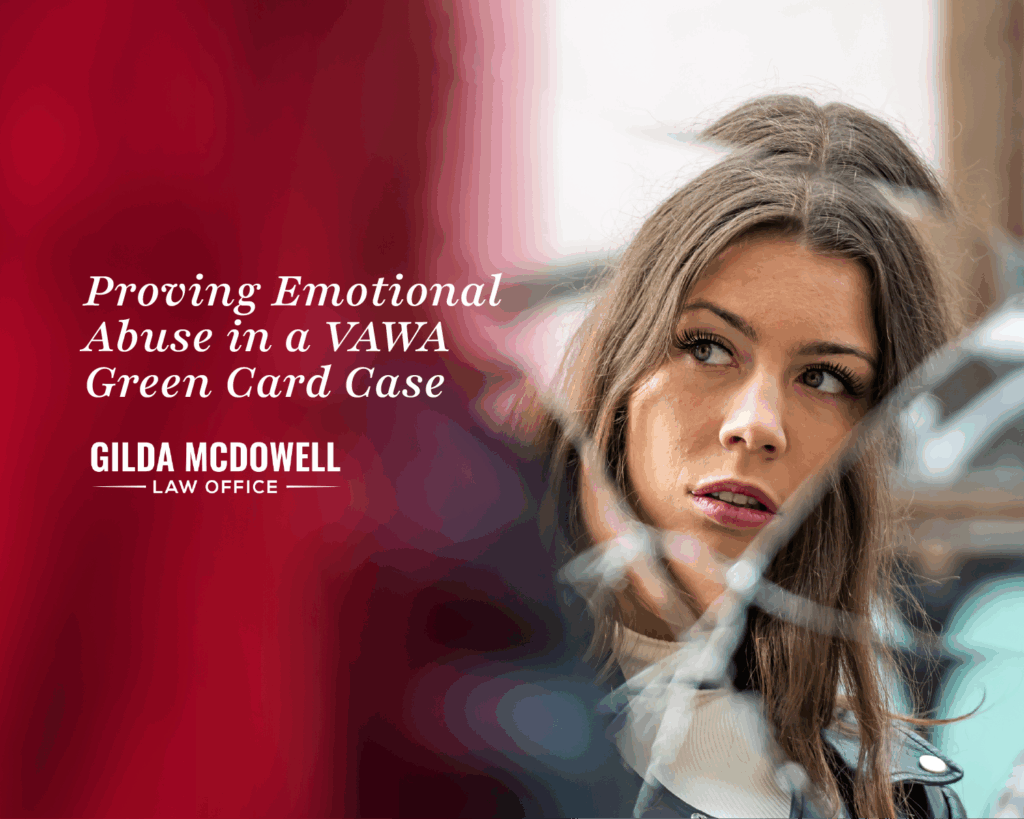No Bruises. No Proof? Think Again.
If you’ve suffered emotional abuse, you already know the pain is real — even if it doesn’t leave physical marks.
You might feel isolated, anxious, or completely stripped of your confidence. And yet, when you finally gather the courage to seek protection under the Violence Against Women Act (VAWA), you’re faced with one painful question:
How do I prove emotional abuse for a VAWA green card?
For many survivors, this question becomes a roadblock. Emotional abuse is hard to describe — let alone prove to immigration authorities. It’s deeply personal, often hidden, and misunderstood even by those closest to you.
But here’s what you need to know:
U.S. immigration law recognizes emotional abuse as valid grounds for protection under VAWA — and with the right approach, you can prove your case.
This guide will walk you through:
- What emotional abuse looks like under immigration law
- The types of evidence that can support your VAWA petition
- How to build a credible, compelling case — even without visible scars
What Counts as Emotional Abuse in a VAWA Case?
Under VAWA, you may be eligible for a green card if you’ve been abused by a U.S. citizen or lawful permanent resident spouse, parent, or adult child.
That abuse doesn’t have to be physical.
Emotional abuse — also called psychological or mental abuse — includes:
- Constant criticism or verbal attacks
- Threats to harm you, your children, or family abroad
- Isolation from friends, work, or family
- Monitoring your communications or restricting your movements
- Destroying your confidence through insults or manipulation
Emotional abuse is often repeated and subtle, making victims question their own reality. Over time, it can lead to:
- Depression
- Anxiety
- Panic attacks
- PTSD
- Suicidal thoughts
To qualify for a VAWA green card, you don’t have to prove you were hospitalized or injured. But you do need to show that you experienced ongoing emotional harm — and that your relationship with the abuser was central to that trauma.
How to Prove Emotional Abuse for a VAWA Green Card
Immigration officers need concrete evidence — but that doesn’t mean you need a police report or medical file.
You can prove emotional abuse through a combination of personal documentation, third-party support, and consistent testimony.
✅ Examples of Strong VAWA Evidence Include:
📝 Personal Documentation
- Journal entries or written accounts describing specific incidents
- Emails, texts, or voicemails with abusive language or threats
- Letters from friends or family who witnessed the abuse or noticed changes in your behavior
🧠 Mental Health Records
- Therapist evaluations or counseling notes detailing symptoms of trauma
- Diagnosis of depression, anxiety, PTSD or other related conditions
- Letters from social workers or domestic violence advocates
💬 Affidavits and Statements
- A personal declaration (your sworn statement) telling your story clearly and chronologically
- Affidavits from people who knew about the abuse or saw its impact on your daily life
🏠 Supporting Lifestyle Evidence
- Proof of financial control or manipulation (e.g. denied access to bank accounts)
- Documentation of sudden job loss, school withdrawal, or isolation
- Records of attempted marriage counseling, if applicable
📌 Important: Your story doesn’t have to be dramatic — it just has to be real, consistent, and specific. Describe how the abuse made you feel and what it stopped you from doing.
For more on how emotional abuse affects survivors, the National Domestic Violence Hotline offers helpful insights and validation.
Why This Process Feels So Hard — and Why You Can Still Succeed
Many VAWA applicants fear they won’t be believed.
You may worry that your abuser seemed “normal” to others, or that the abuse wasn’t “bad enough” to count.
You may even feel guilty or ashamed — emotions that are common side effects of abuse.
But here’s what matters:
If your partner, parent, or child used emotional tactics to control, intimidate, or isolate you, and if those actions hurt your mental health, you may qualify for VAWA protection.
You don’t need to be perfect.
You don’t need police records.
You need truth — backed by care, consistency, and courage.
FAQs: Proving Emotional Abuse in VAWA Petitions
❓ Do I need a police report or restraining order?
No. While helpful, these are not required to win a VAWA case based on emotional abuse.
❓ Can I apply if I’ve never seen a therapist?
Yes — but consider talking to one now. A mental health evaluation can significantly strengthen your case.
❓ Will USCIS believe me without physical proof?
Yes — especially if your story is well-documented and supported by people who know you.
❓ Can men apply for VAWA based on emotional abuse?
Yes. VAWA is gender-neutral. Men, women, and nonbinary individuals can all apply.
❓ What if I’m still living with my abuser?
You may still qualify. Many survivors remain in the home due to fear, financial dependence, or immigration status — and USCIS understands this.
You Deserve Safety — and Legal Protection. Let’s Build Your Case Together.
Trying to prove emotional abuse for a VAWA green card is one of the hardest things you may ever do — but you do not have to do it alone.
Let our team help you:
✅ Understand your eligibility
✅ Gather evidence that strengthens your petition
✅ Share your story with confidence and dignity

